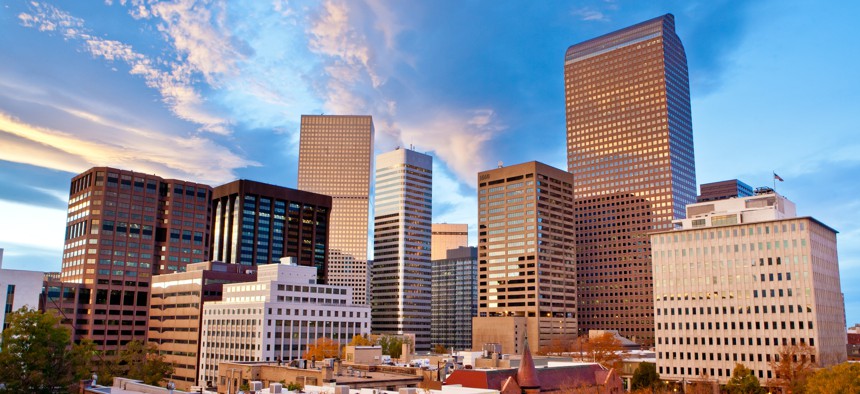A City Asks Residents to Vote on Which Infrastructure Projects to Fund

Downtown Denver skyline. Bridget Calip via GETTY IMAGES.
Denver is turning to “participatory budgeting” to decide how it will use a small slice of its budget for public works projects.
After months of offering ideas and refining proposals, Denver residents now have a direct say in how the city will spend $2 million in infrastructure funds.
Earlier this week, voting opened for Denver’s first “participatory budgeting” initiative, which allows residents to cast ballots for the projects they’d most like to see the city fund. All residents are eligible to vote, regardless of age or immigration status, according to Denver’s finance department.
Denver is one of the latest local governments to experiment with participatory budgeting for a sliver of its budget. Others, including Philadelphia and New York, have run similar programs in the past, often with goals of improving equity and civic engagement.
The amounts of money in play are typically modest compared to overall spending. For instance, Denver’s general fund for fiscal 2023 is expected to be about $1.6 billion. Even so, participatory budgeting can provide a gateway for residents to get involved in the budgeting processes.
The infrastructure-specific initiative in Denver got underway in early summer, when more than 1,000 residents submitted ideas for how the funds should be spent. Over the last two months, a group of community members sifted through those submissions to identify priorities and flesh out proposals with location specifics, descriptions and cost estimates.
The initiative is split into four geographic ballot areas. People living in one of three regions of the city can rank up to three projects in their respective communities and determine how a collective $1 million will be spent.
Everyone else can use a citywide ballot to rank up to five projects for the remaining $1 million. The ballot includes a range of proposals, such as installing outdoor fitness equipment for older adults near an affordable housing complex ($200,000) or building four shower trailers for people who are homeless ($225,000).
“Now we vote—a ‘we’ that includes youth, immigrants and refugees, and others who may not have felt as connected to our city previously, this is what a stronger democracy looks like,” said Denver Councilwoman Robin Kniech in a statement.
The city conducted a voluntary survey among those who submitted ideas for the funding. Of those who chose to identify with a race, 97% were people of color. Meanwhile, 49% reported earning less than $25,000 a year, and 46% said they did not or could not participate in the 2019 city elections.
Voting will remain open through mid-November and residents can submit ballots in person or online.
Molly Bolan is the assistant editor for Route Fifty.
NEXT STORY: The US Cities With the Highest Rents






